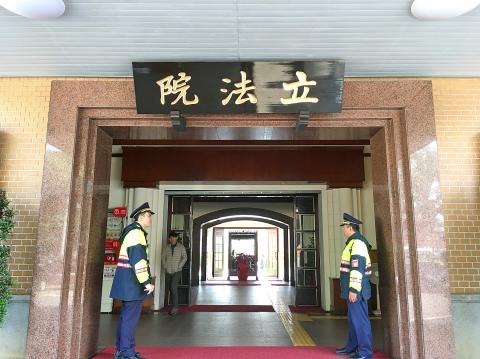The legislative caucuses yesterday agreed to start the new legislative session on Friday next week, and have Premier Su Tseng-chang (蘇貞昌) give an administrative report and answer lawmakers’ questions.
Members of the four caucuses convened to discuss the new session’s starting date.
The Constitution stipulates that a legislative session must begin within a month of lawmakers being inaugurated, meaning that the new session must begin before Feb. 27, Democratic Progressive Party (DPP) caucus whip Ker Chien-ming (柯建銘) said, adding that they chose from three dates: Tuesday next week, Friday next week and Feb. 25.

Photo: Lin Liang-sheng, Taipei Times
Friday is the most suitable time, as the Executive Yuan is scheduled to sponsor a special relief bill for the COVID-19 outbreak in China, Ker said.
New Power Party (NPP) caucus whip Chiu Hsien-chih (邱顯智) said that if the session were to start on Tuesday next week, agencies drafting the bill could fine-tune it according to lawmakers’ suggestions during the question-and-answer session.
Taiwan People’s Party (TPP) caucus whip Lai Hsiang-ling (賴香伶) echoed Chiu’s remarks.
Chinese Nationalist Party (KMT) caucus whip Lin Wei-chou (林為洲) said that starting the session on Tuesday would give lawmakers more time to review the proposal.
Ker said that agencies tasked with disease prevention are busy and asked the other caucuses to give them time to monitor the situation.
KMT caucus secretary-general Chiang Wan-an (蔣萬安) said that his caucus agreed to the session starting on Friday on the condition that the Executive Yuan delivers a special written report on efforts to contain COVID-19.
Ker commended Chiang’s proposal, saying that it is the Executive Yuan’s duty to add content on disease prevention efforts to its report, which was delivered to the legislature before the outbreak.
Su should set aside time in his oral report to talk about the government’s efforts to combat the disease, Ker said.
After the TPP and NPP caucuses accepted Chiang’s proposal, Legislative Speaker Yu Shyi-kun (游錫堃) announced the new session’s starting date, and that Su would give an administrative report that is to include a presentation on efforts to contain COVID-19.
The caucuses are to issue a joint statement on that day to urge the WHO to allow Taiwan’s participation in the world health body as COVID-19 spreads globally.
Each caucus is to appoint a representative to discuss the wording of the resolution, which is to be signed by all caucuses on Thursday next week and issued during a plenary session the following day.

Alain Robert, known as the "French Spider-Man," praised Alex Honnold as exceptionally well-prepared after the US climber completed a free solo ascent of Taipei 101 yesterday. Robert said Honnold's ascent of the 508m-tall skyscraper in just more than one-and-a-half hours without using safety ropes or equipment was a remarkable achievement. "This is my life," he said in an interview conducted in French, adding that he liked the feeling of being "on the edge of danger." The 63-year-old Frenchman climbed Taipei 101 using ropes in December 2004, taking about four hours to reach the top. On a one-to-10 scale of difficulty, Robert said Taipei 101

Nipah virus infection is to be officially listed as a category 5 notifiable infectious disease in Taiwan in March, while clinical treatment guidelines are being formulated, the Centers for Disease Control (CDC) said yesterday. With Nipah infections being reported in other countries and considering its relatively high fatality rate, the centers on Jan. 16 announced that it would be listed as a notifiable infectious disease to bolster the nation’s systematic early warning system and increase public awareness, the CDC said. Bangladesh reported four fatal cases last year in separate districts, with three linked to raw date palm sap consumption, CDC Epidemic Intelligence

US climber Alex Honnold left Taiwan this morning a day after completing a free-solo ascent of Taipei 101, a feat that drew cheers from onlookers and gained widespread international attention. Honnold yesterday scaled the 101-story skyscraper without a rope or safety harness. The climb — the highest urban free-solo ascent ever attempted — took just more than 90 minutes and was streamed live on Netflix. It was covered by major international news outlets including CNN, the New York Times, the Guardian and the Wall Street Journal. As Honnold prepared to leave Taiwan today, he attracted a crowd when he and his wife, Sanni,

Taiwanese and US defense groups are collaborating to introduce deployable, semi-autonomous manufacturing systems for drones and components in a boost to the nation’s supply chain resilience. Taiwan’s G-Tech Optroelectronics Corp subsidiary GTOC and the US’ Aerkomm Inc on Friday announced an agreement with fellow US-based Firestorm Lab to adopt the latter’s xCell, a technology featuring 3D printers fitted in 6.1m container units. The systems enable aerial platforms and parts to be produced in high volumes from dispersed nodes capable of rapid redeployment, to minimize the risk of enemy strikes and to meet field requirements, they said. Firestorm chief technology officer Ian Muceus said